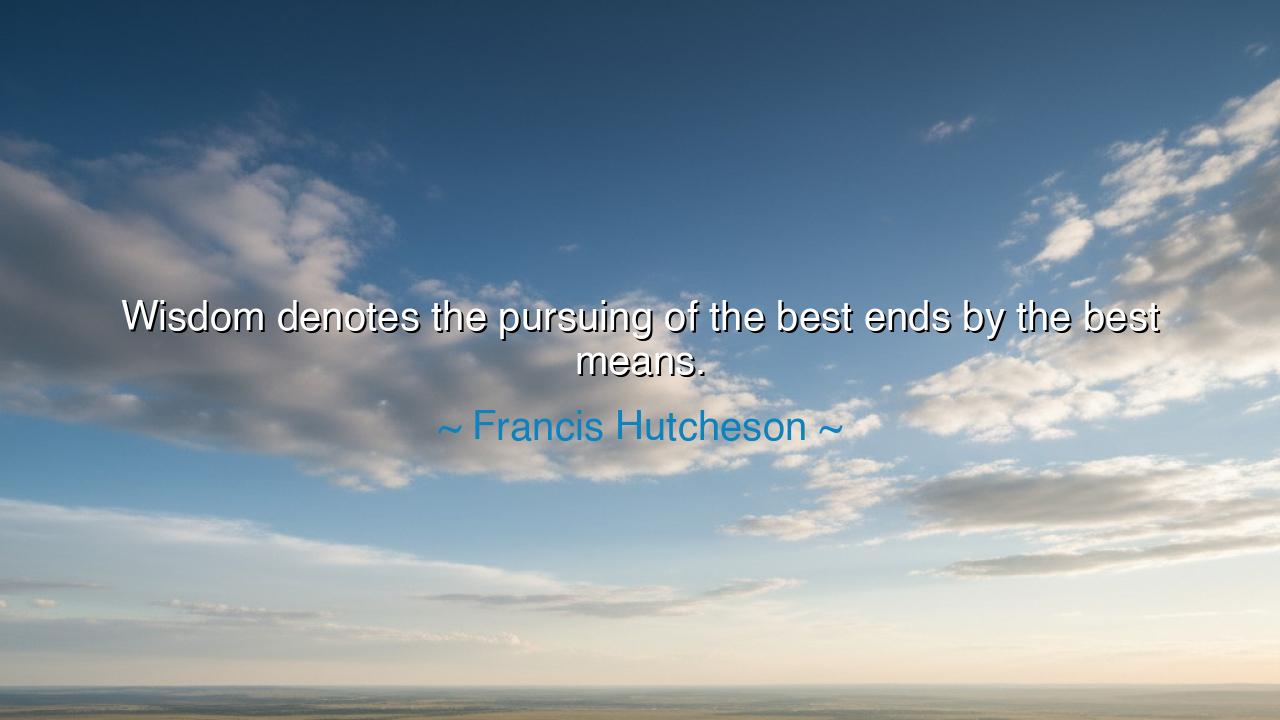
Wisdom denotes the pursuing of the best ends by the best means.






Francis Hutcheson, philosopher of the Scottish Enlightenment, gave voice to an eternal principle when he said: “Wisdom denotes the pursuing of the best ends by the best means.” In this, he binds together two pillars of the human journey—ends and means—reminding us that greatness is not measured by desire alone, nor by method alone, but by the harmony of both. For to seek noble ends with corrupt means is hypocrisy, and to use noble means for base ends is folly. Only when both shine together does true wisdom reveal itself.
The best ends are those aligned with justice, truth, and the flourishing of life. Men may dream of kingdoms, wealth, or dominion, but if such goals do not elevate the soul and uplift others, they are shadows, not light. The best means are those which honor integrity, courage, and compassion. For what does it profit a man if he gains the world by treachery, or achieves victory by cruelty? Such triumphs rot quickly. Hutcheson, like the ancients, saw that wisdom lies in a unity: the pursuit of worthy purposes by righteous paths.
History offers us luminous examples. Consider Abraham Lincoln, who sought the end of preserving the Union and abolishing slavery. These were the best ends—not for his own gain, but for the freedom and dignity of millions. Yet Lincoln also sought to achieve them by the best means—through persuasion, lawful authority, and appeal to the moral conscience of a divided nation. Though the path was hard and the cost heavy, his legacy endures because his wisdom joined just ends with just means.
By contrast, history warns of those who pursued noble ends by vile methods. The French Revolution began with the end of liberty, equality, and fraternity—goals radiant and pure. Yet by choosing means of blood and terror, the movement devoured itself, leaving tyranny in its wake. Thus Hutcheson’s insight stands: even the noblest end is corrupted when sought through unjust means. True wisdom requires that both be righteous, lest victory turn to ruin.
O children of time, learn this well: the path matters as much as the destination. Let your ends be worthy of heaven, and your means be worthy of your soul. For only then will your works endure beyond the dust of years. This is the law of Hutcheson, echoing the voices of sages before him: that wisdom denotes the pursuing of the best ends by the best means—and in this harmony lies the true greatness of man.






MTnguyen minh thu
Reading this, I’m intrigued by the notion that wisdom is inherently practical and ethical. It’s not enough to know the right goals; one must also act in ways that are aligned with those goals. I’m curious about situations where the ‘best means’ are ambiguous or contested. How does one weigh efficiency, morality, and impact when choosing a path forward? I’d like a perspective on whether Hutcheson’s definition could serve as a guide for everyday decision-making and leadership practices.
CLHuynh Cong Linh
This quote makes me reflect on personal growth and moral development. It seems to suggest that wisdom requires continual evaluation of both our objectives and our actions. I feel that this dual focus can help prevent well-intentioned but harmful decisions. I wonder how one cultivates the skill to consistently choose effective, ethical means while aiming for worthy ends. Could mentoring, reflection, or philosophical study enhance this kind of practical wisdom?
KMKhanh Mna
Hutcheson’s words make me think about ethical leadership. If wisdom involves choosing the best ends with the best means, it raises questions about decision-making in high-stakes environments. I’m curious whether leaders can ever fully reconcile competing interests and what frameworks might help. How do we assess the quality of our methods in pursuit of important goals, especially when outcomes are uncertain or the stakes affect many people?
HDHoa Dinh
I find this statement both challenging and inspiring. It implies that wisdom is not merely about knowing what is good but actively aligning our actions with those goals. I wonder how often people pursue noble ends but fail because of poor methods. Could this concept apply to education, governance, or personal development, guiding us to consider strategy and ethics simultaneously? I’d like perspectives on practical ways to evaluate whether our means are truly the best.
BBBao Bui
This quote prompts me to reflect on the balance between intention and action. I feel that Hutcheson suggests wisdom is more than knowledge—it’s the discernment to choose appropriate methods for meaningful goals. I’m curious how this applies in real-world situations where the best means might be unclear or conflicting. How can individuals cultivate the judgment to identify both ethically sound methods and desirable outcomes in complex scenarios?